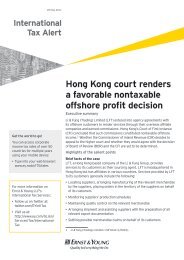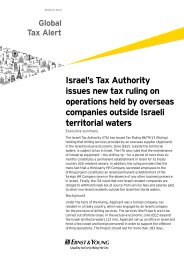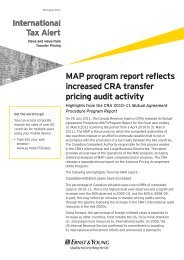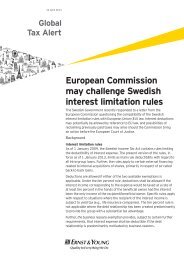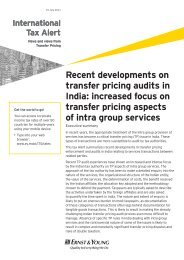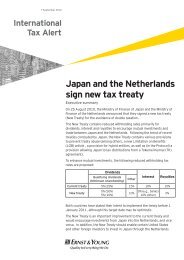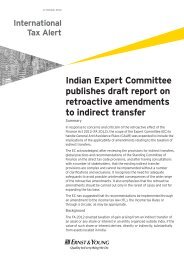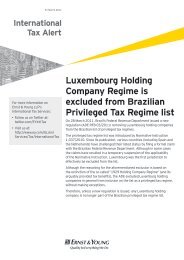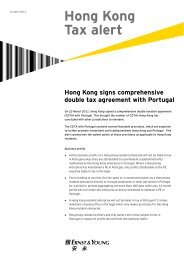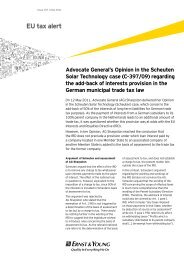Download - Ernst & Young T Magazine
Download - Ernst & Young T Magazine
Download - Ernst & Young T Magazine
Create successful ePaper yourself
Turn your PDF publications into a flip-book with our unique Google optimized e-Paper software.
Credit: Keystone / Ria Novosti / Ruslan Krivobok<br />
Kraft Foods Ukraine has been one of the company’s top performing divisions globally.<br />
Case study<br />
Kraft Foods Ukraine’s<br />
succession success<br />
Planning ahead<br />
The departure of a<br />
veteran CEO, along with a<br />
management reshuffle,<br />
helped prove the resilience<br />
of the firm’s in-depth<br />
transition planning.<br />
Kraft Foods Ukraine (KFU) faced a major<br />
succession challenge in 2011, when the<br />
company’s veteran Ukrainian-American CEO<br />
George Logush left to work for local poultry<br />
producer MHP. Logush had played an integral<br />
role in the company’s growth and success over<br />
the prior 16 years, so this was a hard blow for<br />
the company. During his tenure, Kraft’s sales in<br />
Ukraine had grown more than 100-fold to some<br />
US$500 million in 2011, helping to make the<br />
Ukraine one of the US food giant’s 10 priority<br />
emerging markets.<br />
The succession challenge was exacerbated by<br />
the fact that three other KFU senior managers<br />
were moving on to other internal roles at the<br />
same time, while several changes were also<br />
taking place in the company’s board. All this<br />
came after a full decade with zero turnover in<br />
KFU’s top management. “This was not something<br />
we could have expected to happen<br />
simultaneously, but when the opportunities<br />
arise, and when you have the talent in the<br />
pipeline, you have to be able to respond to these<br />
opportunities,” says Oksana Semenyuk, the<br />
company’s HR Director.<br />
In the end, the transition process for the top<br />
job went smoothly, which Semenyuk credits to<br />
the attention that senior management pays to<br />
succession planning in the business, with Taras<br />
Lukachuk, a Ukrainian national who had worked<br />
for Kraft for more than 10 years, taking the<br />
helm. “The whole succession had been preceded<br />
by years of preparation, so there were no conflict<br />
or arguments,” she says. “Everything was<br />
planned ahead, with a deep bench of senior<br />
management talent developed over years, and<br />
Mr Lukachuk knew several years in advance that<br />
he was the preferred successor, so underwent a<br />
period of targeted training.”<br />
As part of the succession management<br />
process, and to provide him with the necessary<br />
managerial experience, Lukachuk had been<br />
appointed several years earlier as the General<br />
Manager of the subdivision in charge of all 11<br />
markets under KFU’s control. He also worked<br />
intensively with a management coach to prepare<br />
for the role. Today, he represents the first of a<br />
new generation of local managers playing a<br />
senior role in running the multinational’s local<br />
operations in the Ukraine.<br />
One of the direct benefits of the firm’s longrunning<br />
career development program is its<br />
ability to help with talent retention. This is a key<br />
focus within KFU. “Being able to offer long-term<br />
career development, particularly with an<br />
international dimension, undoubtedly helps with<br />
our management retention,” says Semenyuk.<br />
“KFU has about 3% employee turnover<br />
compared with a figure of five or six times that<br />
for the Ukrainian economy as whole.” This is<br />
helped by the ability of local business units to<br />
develop customized employee development<br />
programs and tools, including programs to help<br />
address work-life balance issues of employees.<br />
Succession is seen as a key part of this<br />
integrated talent management process, and is<br />
directly linked to performance management,<br />
leadership development, reward and recognition.<br />
“Talent management is about getting the right<br />
people, with the right skills, into the right jobs,”<br />
says Semenyuk. “It starts with the definition of<br />
the goal and strategy of the business. We have<br />
our main financial target, brand strategies and<br />
the overall strategies. We need to translate all<br />
these business objectives into people<br />
management strategies to help the organization<br />
to achieve its overall objective. The foundation<br />
of KFU’s success is our people strategies.”<br />
HR plays a major role in this too, along with<br />
senior management, as part of a program that<br />
works on developing successors for all key<br />
positions in the company. “All employees have<br />
their own three- to five-year career path<br />
development plan, divided into stages with<br />
specific goals. And it is essential to meet these<br />
goals if managers wish to progress in the<br />
company,” says Semenyuk.<br />
Indeed, KFU’s track record on management<br />
development has been excellent. Over the<br />
previous decade, it has developed a number of<br />
top managers for Kraft’s headquarters and other<br />
regional branches of the company, including vice<br />
presidents in Central and Eastern Europe,<br />
directors who used to work in South Africa and<br />
middle managers who worked in assignments in<br />
their worldwide head offices in Chicago, USA.<br />
<strong>Ernst</strong> & <strong>Young</strong> Issue 07 T <strong>Magazine</strong> 47



